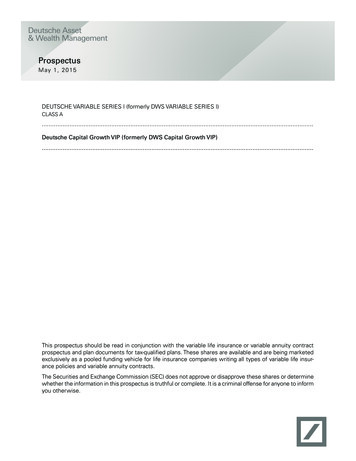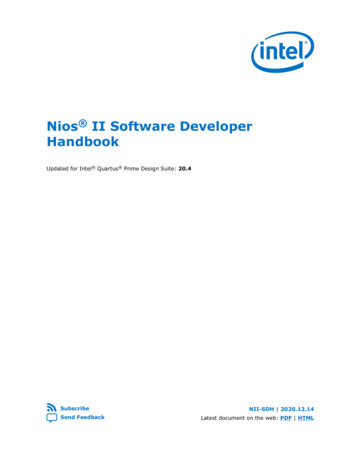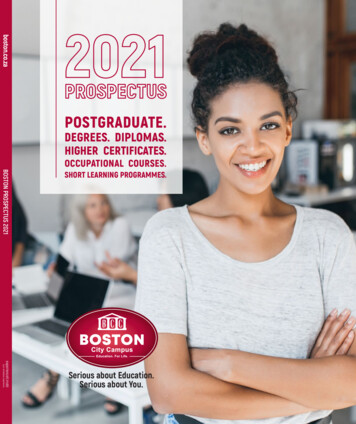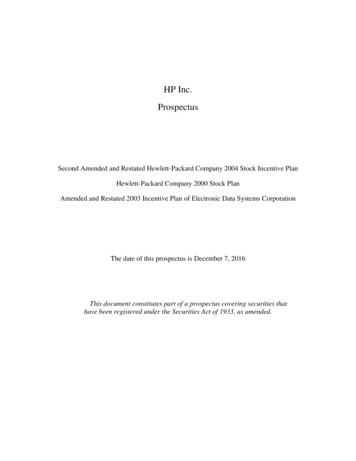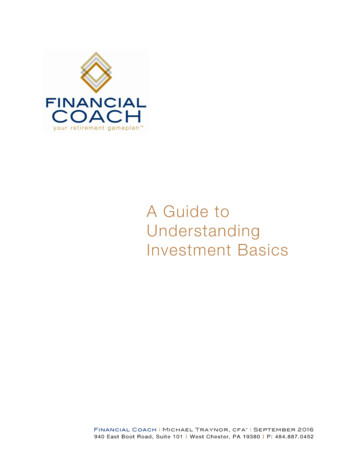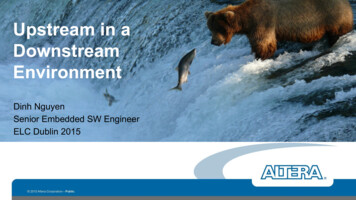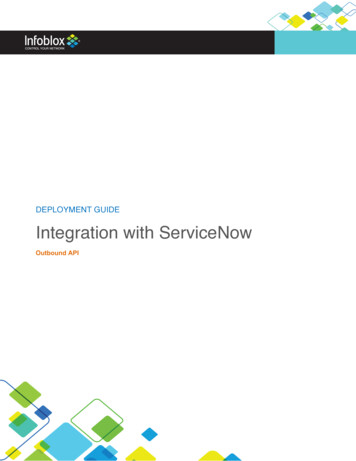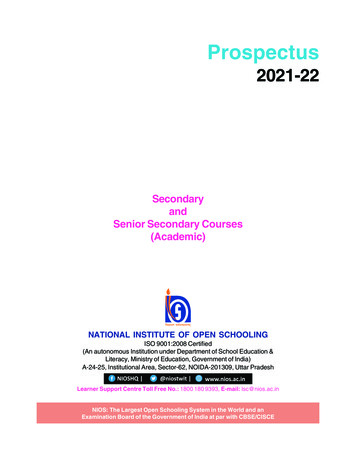
Transcription
Prospectus2021-22SecondaryandSenior Secondary Courses(Academic)NATIONAL INSTITUTE OF OPEN SCHOOLINGISO 9001:2008 Certified(An autonomous Institution under Department of School Education &Literacy, Ministry of Education, Government of India)A-24-25, Institutional Area, Sector-62, NOIDA-201309, Uttar PradeshLearner Support Centre Toll Free No.: 1800 180 9393, E-mail: lsc@nios.ac.inNIOS: The Largest Open Schooling System in the World and anExamination Board of the Government of India at par with CBSE/CISCE
Press for:1. Payment ofExamination fee2. Date Sheet3. Examination Centres4. Change ofExamination Centre5. Requirements aboutexamination; OnDemandExamination;subject; and anytype of correctionIf you have not yet registered,Press for:1. Date of admission2. Admission Fees3. Entry requirements4. Subject selectionIf you have registered, Pressfor:1. Admission status2. Despatch of CourseMaterial3. Tutor Marked Assignments(TMAs)4. Transfer of Credit (TOC)and Re-admission5. Change of subject,additional subject and forany type of correctionPress for:1. Secondary Exam.Result2. Senior SecondaryExam. Result3. On-DemandExamination Result4. Re-checking ofMarks5. Marks6. Mark Sheet/Migrationor ProvisionalCertificate7. Duplicate documentsPress 3ForResultPress * To go back to previous menuPress 2ForExaminationPress 1ForAdmissionPress – 1 for HindiPress for:1. VocationalCourses and feecharged2. AccreditedVocationalInstitutes (AVIs)3. Study Material4. Examinationand Evaluationprocess5. Life EnrichmentCoursesPress for:1. BodyInformation2. SubstanceAbuse3. Relationship4. SexualDiseasesPress 9 To speak to LSC executivePress for:1. Academic Coursesoffered by NIOS2. Equivalency of NIOSCertificate3. Medium of instruction4. Sample QuestionPapers, Syllabus andprevious year's Q.P.5. Choice of subjects6. Personal ContactProgramme (PCP)Press 6ForLife SkillPress for:1 Processing fee2 Documentsrequired3 Process ofaccreditation4 Status ofApplication forAccreditationPress 7ForAccreditationPress – 2 for EnglishPress 5Press 4For VocationalForCoursesAcademic CoursesWelcome MessageDial 1800 180 9393Press 9To speak toLSC ExecutiveNIOS has established the Learner Support Centre (LSC) to redress learners related various issues through email, Interactive Voice Response System (IVRS)and Toll Free No.Adiagrammatic presentation of the framework of the Learner Support Services (LSC) of NIOS is given below.NIOS believes and hopes that learners do not face any problem and do not have any grievance while taking admission and during their studies. In this context,Learner Support Centre (LSC)National Institute of Open Schooling (NIOS)
Reasons to ChooseNational Institute of Open Schooling1. Freedom to LearnThe main aim of NIOS is to 'reach the unreached'. The NIOS follows the principle of freedom to learn i.e., what to learn,when to learn, how to learn and when to appear for the examination are decided by the Learner. There is no restriction oftime, place and pace of learning.2. FlexibilityThe NIOS provides flexibility with respect to : Choice of Subjects: The learner has the option to choose subjects of his/her choice from the given list keepingin view the passing criteria. Admission: The learner has the option to take admission Online under various streams or through StudyCentre, Facilitation Centre, Regional Centre for the Secondary and the Senior Secondary Education Courses. Examination: The Public Examinations are held twice in an year. Nine examination chances are offered to thelearner in five years. A learner can appear in examination during this period as and when he/she is well preparedand can avail the facility of credit accumulation. On Demand Examination: The learner has also the option to appear under the On-Demand ExaminationSystem (ODES) of NIOS at the Secondary and the Senior Secondary levels at the NIOS Headquarters,NOIDA, at the Regional Centres of NIOS, and at designated Kendriya Vidyalayas across India. A learner iseligible for On Demand Examination after the first public examination.3. RelevanceThe NIOS courses and programmes are functional, useful in daily life and also set pathways for further studies. Successfulalumni of NIOS are pursuing higher studies in institutions of international and national repute like IITs, the Delhi University,the Jamia Hamdard, the Jamia Millia Islamia, the Aligarh Muslim University, the Punjab University, the Allahabad Universityand many other reputed institutions of higher learning and in professional institutions.4. Transfer of CreditsThe NIOS acknowledges previous knowledge by allowing transfer of credits of upto two subjects passed from International,National and State Boards of Examination / State Open Schools with whom NIOS has entered into agreements.5. Recognised Quality EducationThe NIOS takes conscious steps to provide quality education. The Govt. of India has vested in NIOS the authority toconduct Public Examinations and provide the Secondary and the Senior Secondary level certificates, which are equivalentto the certificates provided by any other Board of School Education. This is because all the Boards, whether National orState, are following the National Curriculum Framework brought out by the National Council of Educational Researchand Training (NCERT). The NIOS is one of the three National Boards; the other two Boards are (i) the CentralBoard of Secondary Education (CBSE) and (ii) the Council for Indian School Certificate Examination (CISCE).
Frequently Asked Questions (FAQs)about NIOS and its Programmes1.What is the procedure for taking admission in NIOS?Ans:The NIOS has 100% Online admission at the Secondary and the Senior Secondary Education levels in order tofacilitate learners to register.Under this scheme, the learner has three options:(i)Learner can register online directly by visiting the website of NIOS i.e., www.nios.ac.in and sdmis.nios.ac.in.(ii)Learner may visit his/her nearest AI (Study Centre)/Facilitation Centre and take help for online registration.(iii)Learner may visit the concerned Regional Centre of NIOS and take help for online registration.(iv)Learner can use the services of the Common Services Centres of the Govt. of India for Online registrationthroughout the country.2.What is the eligibility criteria for admission to the Secondary Course?Ans: A learner who has passed class VIII and has a valid proof that Learner has attained 14 years of age can applyfor registration to the Secondary Course. The learner who gives a self certificate stating that “I have studied and able to pursue the secondary course” isalso eligible for admission to the Secondary Course. The learner who had studied at the Secondary level can also seek admission in NIOS either to complete hiscourse or to improve his performance. Residential proof of the learner.3.What is the valid proof of date of birth?Ans:The certificate of date of birth issued by a Municipal Corporation, a Municipal Body, a Village Panchayat or any otherbody authorised by the Registrar, Birth and Death, Government of India, and the Aadhaar Card issued by some Govt.Agency is a valid proof of date of birth. However, in case of orphans, street children etc., a medical certificate inrespect of age issued by a Government Hospital is also acceptable as a valid proof of date of birth.4.What is the validity period of admission?Ans:The Admission (once registered) is valid for a period of 5 years from the date of admission.5.Does NIOS allow any fees concession?Ans:The fee concession is provided to females, SC/ST/Ex-Servicemen and differently abled/Divyang learners as perNIOS norms.6.Can any learner take direct admission in the Senior Secondary courses?Ans:No. In order to take admission in the Senior Secondary course, the learner must have passed the Secondary coursefrom a recognised Board.7.What is the Minimum age to take admission in the Senior Secondary Course?Ans:The minimum age to take admission in the Senior Secondary Course is 15 years.8.What are the mediums of studies available in NIOS?Ans:The NIOS offers the Secondary course in English, Hindi, Urdu, Marathi, Odia, Telugu, Gujarati, Tamil, Malayalam,Punjabi, Assammese, Sanskrit and Kannada mediums; and the Senior Secondary course in English, Hindi, Odia,Bengali, Gujarati, Sanskrit and Urdu mediums.9.What are the subjects available for the Secondary Course (Class-X)?Ans:Hindi, English, Urdu, Sanskrit, Bengali, Odia, Marathi, Telugu, Gujarati, Kannada, Punjabi, Assamese, Nepali,Malayalam, Arabic, Persian, Tamil, Sindhi, Mathematics, Science and Technology, Social Science, Economics,Business Studies, Home Science; Psychology, Indian Culture and Heritage, Painting, Data Entry Operations,Accountancy, Hindustan Sangeet, Carnatic Sangeet, Veda Adhyan, Sanskrit Vyakaran, Bharatiya Darshan, SanskritSahitya, Entrepreneurship. (36 subjects including 18 languages).10.What are the subjects available for the Senior Secondary Course (Class-XII)?Ans:Hindi, English, Bengali, Odia, Tamil, Urdu, Sanskrit, Gujarati, Punjabi, Persian, Arabic, Malyalam, Mathematics,Physics, Chemistry, Biology, History, Geography, Political Science, Economics, Business Studies, Accountancy,Home Science, Psychology, Computer Science, Sociology, Painting, Environmental Science, Mass Communication,Data Entry Operations, Introduction to Law, Library and Information Science, Veda Adhyan, Sanskrit Vyakaran,
Bharatiya Darshan, Sanskrit Sahitya, Physical Education and Yog, Military Studies, Military History and Early ChildhoodCare and Education (41 subjects including 12 languages).11.Whether a learner can change his/her subjects during the validity period of his/her admission?Ans:Yes. A learner has the option to change one or more subjects, provided the total number of subjects does not exceedseven. Subjects already passed cannot be changed.12.How many subjects are required to be taken for obtaining the pass certificate ?Ans:For obtaining a pass certificate at the Secondary level, a learner is required to pass in minimum five subjectsincluding one or maximum two languages.13.Can the learner seek admission in additional subjects also?Ans:Yes. A learner can opt upto two additional subjects. Thus, in all, a learner can choose maximum of seven subjects.14.What is the admission fee for registration and the examination fee?Ans:The latest fee structure for registration and examination has been given on NIOS website as also in the Prospectus.15.Can a learner take admission in the Secondary/Senior Secondary Course of NIOS after passing the Secondary/Senior Secondary course from a formal Board of School Education?Ans:Yes. In case the learner has completed the Secondary/Senior Secondary Course from any National/State Boardof School Education and wish to seek admission in NIOS for the same course, he/she will be allowed to takeadmission in NIOS in upto four subjects. On successful completion, the learner will get only the Marksheet. NoCertificate is issued under the Dual/Part Admission Scheme.16.How do the learner get confirmation of his/her admission?Ans:The admission to a particular course is normally confirmed by NIOS by issuing an Identity Card having his/heradmission particulars as per the records available with NIOS. On confirmation of admission, Enrolment Number isalso informed to the learner.17.How does the learner get the self-instructional material?Ans:The specially designed printed Self Instructional Material for different subjects alongwith other support material isprovided to the learner through post at his/her home address. A learner is, therefore, expected to give his/hercorrect and complete home address.18.How can a learner procure his/her study material in case the parcel is not delivered?Ans:In case of undelivered parcel of study material, the learner is required to pay Rs. 100/- (Rupees one hundred only)through online Credit Card/Debit Card/Net Banking for re-despatch of study material at his/her residence to theMaterial Distribution Unit, C/o CWC, G.T. Karnal Road, Rana Pratap Bagh, Delhi-11003319.Is there any provision for correction in admission records?Ans:Since the admission is 100% online, the learner is required to be careful while making entries in him/herapplicationform. However, the correction will be done as per the Guidelines displayed on NIOS website.20.Whether NIOS issues Duplicate Identity Card?Ans:Yes, In case of loss of Identity Card, a duplicate Identity Card can be issued. For obtaining Duplicate IdentityCard, first lodge an FIR with the concerned Police Station. Than apply online through E-Service and thelearner may upload the copy of FIR and pay the fee of Rs. 100/- through online mode and second time forobtaining the duplicate Identity Card, the learner will have to pay the fee of Rs. 500/-.21.Can a learner choose any subject combination?Ans:Yes, a learner has the option to choose subjects of his/her choice from the list of subjects provided at NIOS websiteand Prospectus keeping in view the Pass Criteria and Certification Criteria, as also the requirement of other Boards/Universities for further education.22.Whether a learner has the option to take vocational subjects along with academic courses at the Secondaryand the Senior Secondary levels?Ans:Yes, in order to make NIOS courses more meaningful, Vocational Education Courses are offered independentlyand also in combination with academic subjects at the Secondary and the Senior Secondary levels.23.Are the Common Services Centres of the Government of India authorised to act as NIOS Facilitation Centres?Ans:Yes, NIOS has entered into an MoU with CSC e-Governance India Ltd., Ministry of Information and Technology,Government of India. All the Common Services Centres throughout the country act as Facilitation Centres of NIOSwhere any prospective learner can avail various online facilities of NIOS at the prescribed rates.The amount as per these rates is to be paid by the learner and will be in addition to the registration fee of NIOS.
Learner's Responsibilities : At a Glance Do not fill up the Online Application Form for Admission without reading theinstructions. Do not leave any column blank in the Online Application Form for Admission. Do not submit Application Form for Admission without uploading the supportingdocuments. Please note that admission fee is to be sent online only. Do not get influenced by unauthorized agencies that falsely guarantee successof learners. Do not forget to submit original Marksheet while applying for Transfer of Credit(TOC). Do not pay anyone extra amount for online admission and examination. Do not miss the Personal Contact Programmes (PCPs) in each subject which AIs(Study Centres) have to provide on compulsory basis. Do submit your Assignment Response Sheets timely i.e., Tutor Marked Assignments(TMA) timely to your study centre. Do not indulge in unfair means such as copying, impersonation etc., during examinations. Please note that Examination Fee is also required to be paid online only. Learner is required to provide valid E-mail ID and the mobile number for SMS alerts.A learner seeking admission through Stream-1 in Block I andBlock II in 2021-22 can appear first time only in April-May andOctober-November Examinations respectivelyin the year 2022.Information about NIOS that the learner needs during the course of his/herstudies is available on NIOS website.Please log on atwww.nios.ac.inWhenever the learner communicates with NIOS Study Centre or theconcerned Regional Centre, he/she should not forget to mention his/herreference number, name, enrolment number and complete address.
Content1.NIOS – A Schooling Systemwith a .112.124.44.54.64.74.84.94.104.118-244.12Features and Flexibilities in NIOSProgrammes, Courses and PathwaysScheme of StudiesCombination of Vocational andAcademic SubjectsAdmission2.12.21-7Procedure for Online AdmissionProcedure for Online Admission directly bylearnersProcedure for Online Admission through RC/CSCEntry RequirementsRe-admission of Ex-NIOS studentsTransfer of Credit (TOC)Dual Enrolment and Part AdmissionFee Structure for AdmissionConfirmation of AdmissionOther Facilities after Admission through e-serviceAbout AI (Study Centre)Procedure for Correction in the Admission .Improvement of PerformanceIssue of Marksheet and CertificateCertification CriteriaScheme of ExaminationsRe-checking of Answer ScriptsUnfair MeansStandard of Education and RecognitionProcedure for correction in the results ofPublic Examination/On Demand ExaminationAwards and Scholarships for NIOS Learners5.Tutor Marked Assignments (TMAs)6.General and Specific Provisions39-44(Disability wise) in the context of NIOSExaminations6.16.26.3Procedural RequirementsGeneral ProvisionsSpecific ProvisionsAppendicesAppendix A:Appendix B :Appendix C :3.Instructional Process at NIOS3.13.23.33.43.53.64.Self Instructional MaterialPersonal Contact Programmes (PCPs)Audio and Video ProgrammesMukta Vidya VaniTutor Marked Assignments (TMAs)For Online Admissions underStreams-2, 3 and 4Evaluation System4.14.24.325-27Public ExaminationsOn Demand Examination System (ODES)Credit AccumulationAppendix D :Appendix E :Appendix F :28-3637-38Appendix G :Appendix H :Appendix I :List of Regional Centres of NIOS45Nomenclature of Common Service Centres(CSC) in different states48Copy of the letter from MHRDrecognising OBE Programmes of NIOS49Copy of resolution of MHRD vesting50authority of examination and certification toNIOSCopy of the Circular issued by the51Association of Indian Universities regardingequivalence of NIOS coursesCopy of the Circular issued by thePharmacy Council of India regardingequivalence of NIOS Certificates52Copy of the Circular issued by theMedical Council of India53Jurisdiction of Army HQ Command vis-a visNIOS Regional Centres54List of Recognised Boards of Sec.and55Sr. Sec. EducationNIOS dk gS ;s liuk] f'kf{kr gks ns'k ;g viuk
The National Institute ofOpen Schooling NIOS is the largest Open Schooling system in the world with cumulativeenrolment of 4.08 million (during last 5 years). 3.85 million learners have already been certified in the Secondary, SeniorSecondary and the Vocational Education Courses of NIOS since 1991. More than 5 lakh learners were admitted during 2019-20 in variouscourses of NIOS. NIOS reaches out to learners through a network of 23 Regional Centres,two Sub Regional Centres, two NIOS Cells, and more than 7400 StudyCentres (AIs/AVIs) spread all over the country and abroad. NIOS imparts education through Open and Distance Learning (ODL) modeusing a mix of self-instructional print material, audio and video programmesupported by Personal Contact Programme (PCP) at AIs. These are furthersupplemented by Radio broadcast (Community Radio), T.V. programmesthrough PM e-Vidya channel No. 10 and 12.and Mukta Vidya Vani (audiostreaming through internet on NIOS website).
NIOS: A SchoolingSystem with a Difference1The National Institute of Open Schooling (NIOS) was set up as the National Open School in 1989 bythe Ministry of Human Resource Development, Government of India, as an autonomous organisation.It provides educational opportunities to persons who wish to study further and qualify for a bettertomorrow. The Mission of NIOS is to provide education to all with special concern for girls andwomen, rural youth, working men and women, SCs and STs, differently abled persons and otherdisadvantaged persons who because of one or other reasons could not continue their education in the formalsystem of education. The aim of NIOS is to reach the unreached. The NIOS has taken special initiatives forimparting education to Jail Inmates by setting up Study Centres in Jails across the country and granting fullfee exemption. The NIOS operates through a network of Twenty Three Regional Centres, two Sub-RegionalCentres, Two NIOS Cells and more than Seven thousand four hundred Accredited Institutions (AIs) andAccredited Vocational Institutions (AVIs) popularity known as Study Centres. These Centres are located inIndia, Nepal and Middle East Countries. For academic courses, admission is through Online only.1.1 Features and Flexibilities in NIOS Age Limit: There is no upper age limit for admission. However, the minimum age forenrolment is 14 years for the Secondary course and 15 years for the Senior Secondarycourse as per information given in the entry requirements in Table-3. Choice of Medium of Instructions: Hindi, English, Urdu, Marathi, Telugu, Gujarati, Malayalam, Tamil, Odia, Punjabi,Assammese, Sanskrit and Kannada mediums at the Secondary stage. Hindi, English, Urdu, Bengali, Gujarati, Sanskrit and Odia mediums at the SeniorSecondary stage.Note: (1) The subjects under the title "Indian KnowledgeTradition" mentioned in the Scheme of Studiesin Table-1 are available in Sanskrit mediumonly at the Secondary and the SeniorSecondary levels.(2) The NIOS Study Material for subject isavialable in Mediums as mentioned in Table1A NOTEThe learner should choose subjectscarefully keeping in view the plansfor higher studies, specific jobs, andrequirement of the concerned Boards,etc.Choice an Subjects: The learner has the option to choose any subject combination fromthe list of subjects offered as per the criteria given in the Scheme of Studies in Table-I.Prospectus 2021-22 1
In case the learner wishes to use NIOS certificate for higher studies, it is in his/her owninterest that he/she keeps in mind the requirements of the Boards/Universities wherehe/she wishs to join after passing the Secondary/Senior Secondary course from NIOS.Some Boards / Universities require specific subject combinations for admission in theInstitutions affiliated to them. For example, for Medical course, various institutes willexpect the learner to have passed with a combination of Chemistry, Physics and Biology/Bio-technology and any other two as languages. A learner who wishs to join formalSchool Board in class XI after passing NIOS examination of class X may opt for subjectscombinations (in 5 or 6 subjects as the case may be) which are acceptable in class XI bysuch formal School Boards, without prejudice to the rights of NIOS. Additional Subjects : The learner has the option to select one or two additional subject(s)either at the time of admission or during the course of study, if he/she so desires or if it isrequired. Combination of Academic and Vocational Education Courses : In order to make theNIOS courses more meaningful, some Vocational Education Courses are also offered incombination with academic subjects at the Secondary and the Senior Secondary levels(Refer Table 2). These Vocational Education Courses have to be taken in theAccredited Vocational Institutions (AVIs). For more details, please refer to theProspectus for Vocational Education Courses. Continuous Assessment : During the course of study, internal assessment of learner'sprogress will be done through Tutor Marked Assignments (TMAs) and Personal ContactProgrammes (PCPs). Flexible Scheme of Admission: The learner has the option to take admission in NIOSthrough Online under various Streams directly or by approaching a nearby Study Centre/Authorised NIOS Facilitation Centre/Common Service Centre of the Ministry of IT,Govt. of India. Flexible Scheme of Examinations: The Public examinations are conducted by NIOStwice in a year. A learner gets nine chances to appear in the public examinationsover a period of five years to complete his/her courses. However, the learner hasalso the option to choose any of the following for getting evaluated and certified:– Public examinations conducted by NIOS twice in a year.– On Demand Examination System (ODES).Credit Accumulation: The learner has the option to appear in one or more subjects inany examination and earn credit which will be accumulated till all five subjects requiredfor certification are successfully completed within a period of 5 years of registration. Transfer of Credit: The learner has the option to avail the facility of Transfer of Credit(TOC) up to a maximum of two subjects passed from a recognised Board of SchoolEducation, provided these subjects are also available in NIOS Scheme of Studies andtheir results can be verified from the concerned Board's website. TOC is given as per theconditions given in Section 2.6. Validity of Admission: The learner's admission is valid for a period of five years.For Public Examination at the Secondary and the Senior Secondary level, a learnermay take nine or fewer chances to successfully complete the course during thevalidity period of admission.2 National Institute of Open Schooling
Part Admission: Under this scheme, the learner may take admission in one or moresubjects but not more than four subjects. On passing, the learner will be issued only theMarksheet. Education of Disadvantaged Groups: To cater to the special needs of people who arephysically, mentally challenged, socially and geographically isolated marginalised and arefrom disadvantaged sections of the society such as street children, working children, ruralwomen, NIOS has set up Special Accredited Institutions called Special AccreditedInstitutions for Education of the Disadvantaged (SAIEDs). Opportunities to Jail Inmates : In order to help Jail inmates to earn livelihoodafter their release from jail and bringing them in mainstream, the NIOS has set upStudy Centres in Jails across the country. Full fee exemption (Admission andExamination fee) is provided to Jail inmates.1.2 Programmes, Courses and PathwaysThe NIOS offers the following courses and programmes :1.2.1 NIOS Virtual Open SchoolingThe National Institute of Open Schooling (NIOS) launched the Virtual Open Schooling (VOS) duringthe year 2014-15 to serve learners through online courses for their education and skill development.Under the Virtual Open Schooling system, the learners get opportunity to study a course online andgain credit for certification purpose.The VOS Platform of NIOS has a Learning Management System (LMS) for givinginformation and direct interaction among learners and teachers in respect of OnlineAdmission, Discussion Forum, Blogs, Online Classes through Video Conferencing,Online Assessment, etc.The following are the advantages of the Virtual Open Schooling (VOS): Online admission, Online content, Online assignments submission, Online classes, and Onlineexamination Flexibility: Anywhere Anytime accessProspectus 2021-22 3
Access to high quality education: Access to quality teachers and peers increases collaboration Powerful innovation: It expands educational opportunitiesCurrently, NIOS is offering following two Vocational Education Courses under VOS:1. Certificate in ICT Applications2. Agriculture and Animal Husbandry.For more details, download the VOS Programme Guide from the link : e.pdfFor latest updates, keep visiting NIOS VOS website. : http://vos.nios.ac.in1.2.2 Schooling of ITI StudentsUnder this scheme, ITI students get an opportunity to earn the Secondary and the Senior SecondaryCertificate (as per their eligibility) who are pursuing eduction through ITIs or have cleared their ITIcourses. For achieving this, they need to make a small effort. They will be receiving Secondary andSenior Secondary Certificate from NIOS apart from their trade certificates from ITI.NIOS has signed a Memorandum of Understanding with the Directorate General of Training (DGT)under Ministry of Skill Development and Entrepreneurship (MSDE), Govt. of India to offer thisscheme. The learner will receive three credits from ITI, and he/she will need to study two additionalsubjects from the NIOS programme.Upon successful completion of two subjects from NIOS, the candidate will get the combinedmark sheet under the TOC scheme of NIOS. The following options will be available to the learnersto choose from:a)One language course of NIOS.b)One academic subject offered by NIOS.More details can be seen at the NIOS website www.nios.ac.in.1.3 Scheme of StudiesThe Scheme of Studies for the Secondary and the Senior Secondary Courses is given in Table-1. Forobtaining a Pass Certificate, a learner is required to pass in a minimum of five subjects includingone or maximum of two languages from Group ‘A’ and other three or four subjects from Group‘B’. However, a learner is free to take upto two additional subjects and thus can choose maximum ofseven subjects.4 National Institute of Open Schooling
Table-1 : Scheme of Studies for Academic CoursesSecondary LevelS.No. CodeS.No.CodeSubjectGroup 28)(231)(232)(233)( 235 )( 236 )( 237 rabicPersianTamilSindhiExamination ofthese subjectswill be held onsame day andsame time.Group Science and Technology*Social ScienceEconomicsBusiness StudiesHome Science*PsychologyIndian Culture & HeritageAccountacyPainting*Data Entry Operations*Hindustani Sangeet*Carnatic Sangeet*Veda Adhyyan#IndianSanskrit Vyakarana#KnowledgeBharatiya Darshan# Tradition #Sanskrit Sahitya#Entrepreneurship Five subjects with either one or two languages from Group A andthe remaining subjects from Group B. Two additional subjects can be taken from either of the twogroups with additional fees as per NIOS norms.#Senior Secondary LevelSubjectGroup 'A'1. (301) Hindi2. (302) English3. (306) Urdu4. (309) Sanskrit5. (307) GujaratiExamination of6. (303) Bengalithese subjects7. (304) Tamilwill be held on8. (305) Odiasame day and9. (310) Punjabisame time .10. (341) Arabic11. (342) Persian12. (343) MalayalamGroup 'B'1. (311) Mathematics2. (321) Home Science*3. (328) Psychology4. (316) Geography*5. (318) Economics6. (319) Business Studies7. (332) Painti
1. What is the procedure for taking admission in NIOS? Ans: The NIOS has 100% Online admission at the Secondary and the Senior Secondary Education levels in order to facilitate learners to register. Under this scheme, the learner has three options: (i) Learner can register online directly by visiting the w
